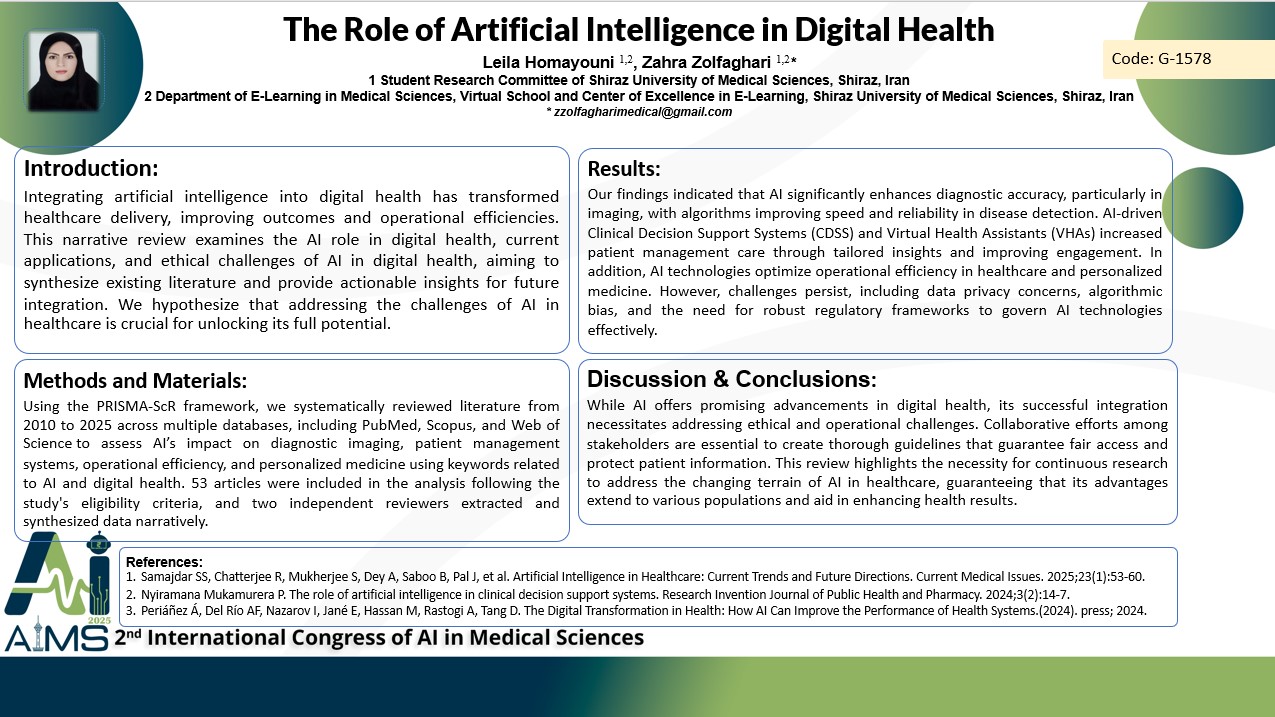نقش هوش مصنوعی در سلامت دیجیتال
کد: G-1578
نویسندگان: Leila Homayouni ℗, Zahra Zolfaghari *
زمان بندی: زمان بندی نشده!
برچسب: سیستم های تصمیم یار بالینی
دانلود: دانلود پوستر
خلاصه مقاله:
خلاصه مقاله
Background and Aims: Integrating artificial intelligence (AI) into digital health has transformed healthcare delivery, improving outcomes and operational efficiencies. This narrative review examines the AI role in digital health, current applications, and ethical challenges of AI in digital health, aiming to synthesize existing literature and provide actionable insights for future integration. We hypothesize that addressing the challenges of AI in healthcare is crucial for unlocking its full potential. Method: Utilizing the PRISMA-ScR framework, we systematically reviewed literature from 2010 to 2025 across multiple databases, including PubMed, Scopus, and Web of Science. The review focused on peer-reviewed articles and reports specifying the effect of AI on diagnostic imaging, patient management systems, operational efficiencies, and personalized medicine. To identify relevant studies, we used keywords related to AI ("artificial intelligence," "machine learning," "deep learning") and digital health ("telemedicine," "mHealth"). The inclusion criteria encompassed peer-reviewed articles in English focusing on AI applications in healthcare settings. 53 articles were included in the analysis following the study's eligibility criteria. Two reviewers independently extracted data and synthesized it narratively. Results: Our findings indicated that AI significantly enhances diagnostic accuracy, particularly in imaging, with algorithms improving speed and reliability in disease detection. AI-driven Clinical Decision Support Systems (CDSS) and Virtual Health Assistants (VHAs) increased patient management care through tailored insights and improving engagement. In addition, AI technologies optimize operational efficiency in healthcare and personalized medicine. However, challenges persist, including data privacy concerns, algorithmic bias, and the need for robust regulatory frameworks to govern AI technologies effectively. Conclusion: While AI offers promising advancements in digital health, its successful integration necessitates addressing ethical and operational challenges. Collaborative efforts among stakeholders are essential to create thorough guidelines that guarantee fair access and protect patient information. This review highlights the necessity for continuous research to address the changing terrain of AI in healthcare, guaranteeing that its advantages extend to various populations and aid in enhancing health results.
کلمات کلیدی
Artificial Intelligence,Digital Health,Clinical Decision Support System
